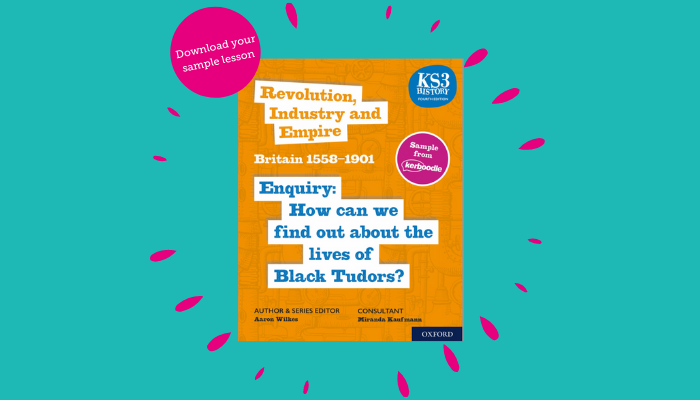History teachers are all too aware of the importance of opening up the study of the past beyond the narrow tramlines that have shaped many schemes of learning over the years. Indeed, it’s clear that many history teachers have been having a good, hard look at some of the topics they teach (and the way they are taught) over the last year or so.
Some teachers have asked publishers to help support them in their efforts to diversify their curriculum. So – over the last few months, the OUP History team have put together a series of historical enquiries that we hope will shine a light on the contributions and experiences of previously underrepresented groups. Working with experts in their field, such as Dr Miranda Kaufmann, we have decided to add to the existing KS3 History course with nine exciting new lessons, spanning three enquiries. OUP is not going to wait to print new editions of the textbooks – we have instead decided to supplement what we offer as part of our commitment to the inclusive presentation of diverse histories, and to better reflect the world around us. Each of these enquiries will be available on Kerboodle in the form of a digital book and supplementary resources.
To give you an idea of how this might work, here’s how you can integrate one of these enquiries with the KS3 History Fourth Edition textbooks you’re already using:
- The first enquiry – now available on Kerboodle – is called ‘How can we find out about the lives of Black Tudors?’
- This enquiry fits in with Chapter 2 (Life in Tudor times) of the Revolution, Industry and Empire: Britain 1558–1901 Fourth Edition Student Book. Chapter 2 looks at various aspects of Tudor society. The chapter itself opens with a focus on the different classes within Tudor society, as referenced by William Harrison’s well known 1597 Description of England. In 2.1A Who’s who?, students define the main groups that make up Tudor society and examine how the poor were treated. This enquiry builds on these lessons by focusing on the experience of Black people in Tudor England.
- The enquiry covers the following topics.
- The first lesson examines the presence of Africans in Britain up to the Tudor era. It details, for example, the Roman Empire’s first African Emperor, who lived in Britain for three years.
- The second lesson looks at the methods used by historians to uncover the hidden stories of Black Tudors, including a source analysis activity about a young woman named Mary Fillis.
- The third lesson investigates the life of John Blanke, a royal musician in the courts of both Henry VII and Henry VIII. Blanke is the only identifiable Black person to have been shown in sixteenth-century English art.
As well as ‘How can we find out about the lives of Black Tudors?’, there are two more coming later this year, which will focus on women in medieval society and the experience of Caribbean soldiers at the time of the First World War. Kerboodle users will get these enquiries automatically, but you can access a free sneak preview of the first enquiry here.
Like lots of the teachers I work with both in schools and in my role with PGCE students at the University of Warwick, OUP are determined to engage with, provoke and open up new ways of thinking about how we all fit into the complex jigsaw that is Britain’s past – and we hope that these enquiries are good ways to start doing this.
What do you think about the enquiry topics we’ve chosen? What other topics would you like to see developed in future? We’d love to know! Do get in touch by emailing [email protected] or message us on Twitter @OUPSecondary

Aaron Wilkes is one of the leading history authors in school publishing as well as being a History teacher at St James Academy, Dudley. Aaron is the author of the new KS3 History 4th Edition series as well as part of our Oxford AQA GCSE History team.
